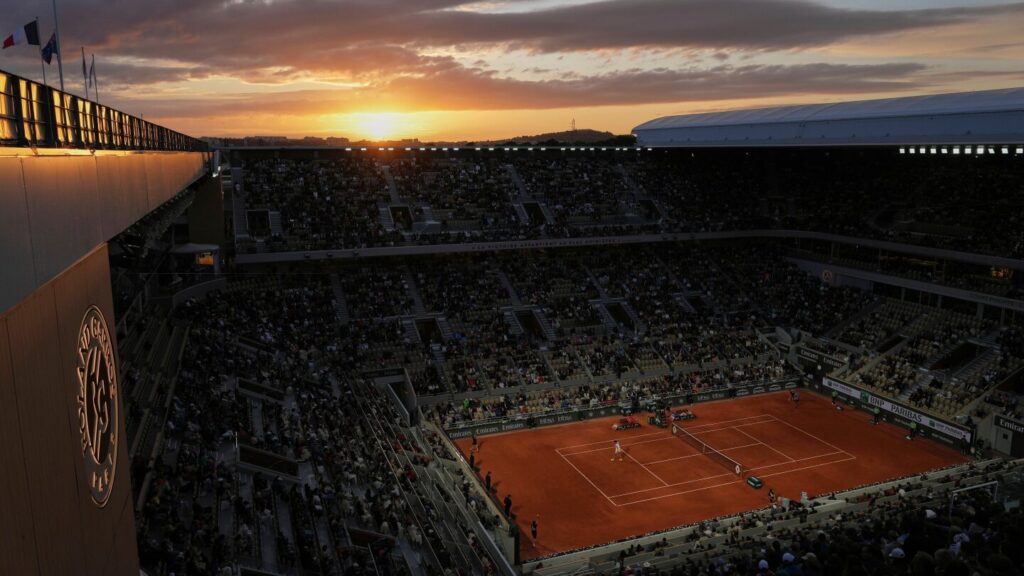PARIS (AP) — Some tennis players, like plenty of people in other walks of life, absolutely hate waking up early to go to work. Not so Coco Gauff, who is just fine with competing at any time of day.
Indeed, the 2023 U.S. Open champion prefers a morning match time to what she referred to as “the graveyard shift” — and at Grand Slam tournaments, there often are contests that stretch past midnight.
So at the French Open, Gauff probably didn’t mind when she saw she was scheduled to face Australian Open champ Madison Keys at 11 a.m. local time (5 a.m. ET) in an all-American quarterfinal Wednesday.
“I’m one of those players that doesn’t care,” said Gauff, a 21-year-old from Florida who is the No. 2 seed in Paris. “I can get up early. I’m not slow to wake up. Once I get some food in me, I’m pretty much good.”
Tennis is an all-day sport at Grand Slam tournaments like the French Open
Tennis is an all-day sport, especially at its Grand Slam tournaments, where ticket sales and TV contracts bring in millions and drive decision-making by organizers. The French Open, U.S. Open and Australian Open all have night sessions that can stretch to 2 or 3 a.m.; Wimbledon has an 11 p.m. curfew.
So in Paris, for example, a match can start at 11 a.m. or 8:15 p.m. or anywhere in between — or, occasionally, much later. It is a frustrating aspect of the sport for the athletes or for fans hoping to see a certain player.
Scheduling at Roland-Garros has been a hot topic, with questions about why the first match every day in the main stadium — before most spectators have arrived, leaving thousands of empty seats — involves women, and why the popular night session exclusively has gone to men.
The primetime slot that hasn’t been offered to any women in Paris since one match in 2023 often means extra attention and exposure.
It also can mean staying up past one’s bedtime.
Madison Keys is done with the night-owl life
“If I could never play at 1 a.m. ever again for the rest of my life, I would be so happy,” No. 7 seed Keys, a 30-year-old born in Illinois and based in Florida, said with a laugh. “You know when you’re going to go on. There’s no chaos. You go to bed at a totally normal time. I feel like I’ve lived my night-owl life, and I would really love to be that first-on slot for the rest of time.”
Other than the initial matches on each court in the morning and at night, it is impossible to know when to warm up and ramp up. Tennis isn’t a timed sport, so it’s anyone’s guess when, say, a day’s third or fourth match in a given arena will begin — and as the temperature and weather shifts across the hours, the clay at the French Open can shift, too.
Daily schedules often are released in the late afternoon or evening prior, and while players can make requests, those aren’t always accepted.
Waking up at 6 a.m. can be a struggle for tennis players
“That’s one thing that’s not good about tennis: We don’t know when we play until the day before,” said Holger Rune, who was the No. 10 men’s seed at the French Open and reached the fourth round.
In team sports, he continued, “They know already in December when they’re going to play in May. You can prepare much easier. We tennis players also (deal with) the change of conditions, the change of countries, surface, whatever.”
When he was a teen participating in junior tournaments, Rune recalled, there were 9 a.m. matches.
“You have to wake up at 6,” the Dane said. “It’s a struggle.”
Emma Navarro, an American who reached last year’s U.S. Open semifinals, is not fond of competing late.
“I’m super particular, I guess would be the word, about my sleep. I got to get my sleep in. I try to get 10 hours a night. If it’s dark outside, I’m probably sleeping,” Navarro said. “I’d prefer, probably, to play first-on than late-night. Around 8 or 9 p.m., I start shutting down.”
Most have their preferences. Carlos Alcaraz, the 2024 men’s champion at Roland-Garros, wants to play in the day. Alexander Zverev, the 2024 runner-up, is a fan of the night.
And then there are those such as No. 8 seed Lorenzo Musetti, an Italian who faced No. 15 Frances Tiafoe of the United States in a quarterfinal that started a little after 3:30 p.m. Tuesday.
“Whatever time they give me,” Musetti said, “I’ll play.”
___
Howard Fendrich has been the AP’s tennis writer since 2002. Find his stories here: https://apnews.com/author/howard-fendrich. More AP tennis: https://apnews.com/hub/tennis
Read the full article here


